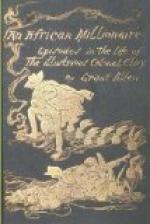I looked back, and saw Césarine, half fainting, on the front door steps, while Dolly, bathed in tears, stood supporting the lady’s-maid, and trying to comfort her. It was clear she had not anticipated this end to the adventure.
“Goodness gracious!” Charles screamed out, in a fresh fever of alarm, as we turned the first corner; “where’s that hansom gone to? How do I know the fellow was a policeman at all? We should have taken the man in here. We ought never to have let him get out of our sight. For all we can tell to the contrary, the constable himself—may only be one of Colonel Clay’s confederates!”
And we drove in trepidation all the way to Bow Street.
XII
THE EPISODE OF THE OLD BAILEY
When we reached Bow Street, we were relieved to find that our prisoner, after all, had not evaded us. It was a false alarm. He was there with the policeman, and he kindly allowed us to make the first formal charge against him.
Of course, on Charles’s sworn declaration and my own, the man was at once remanded, bail being refused, owing both to the serious nature of the charge and the slippery character of the prisoner’s antecedents. We went back to Mayfair—Charles, well satisfied that the man he dreaded was under lock and key; myself, not too well pleased to think that the man I dreaded was no longer at large, and that the trifling little episode of the ten per cent commission stood so near discovery.
Next day the police came round in force, and had a long consultation with Charles and myself. They strongly urged that two other persons at least should be included in the charge—Césarine and the little woman whom we had variously known as Madame Picardet, White Heather, Mrs. David Granton, and Mrs. Elihu Quackenboss. If these accomplices were arrested, they said, we could include conspiracy as one count in the indictment, which gave us an extra chance of conviction. Now they had got Colonel Clay, in fact, they naturally desired to keep him, and also to indict with him as many as possible of his pals and confederates.
Here, however, a difficulty arose. Charles called me aside with a grave face into the library. “Seymour,” he said, fixing me, “this is a serious business. I will not lightly swear away any woman’s character. Colonel Clay himself—or, rather, Paul Finglemore—is an abandoned rogue, whom I do not desire to screen in any degree. But poor little Madame Picardet—she may be his lawful wife, and she may have acted implicitly under his orders. Besides, I don’t know whether I could swear to her identity. Here’s the photograph the police bring of the woman they believe to be Colonel Clay’s chief female accomplice. Now, I ask you, does it in the least degree resemble that clever and amusing and charming little creature, who has so often deceived us?”




